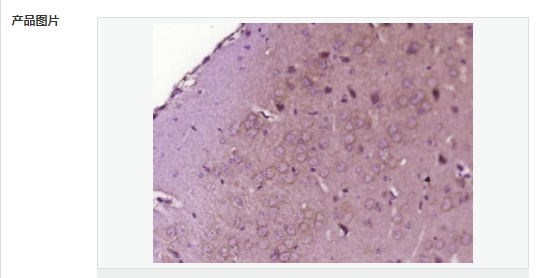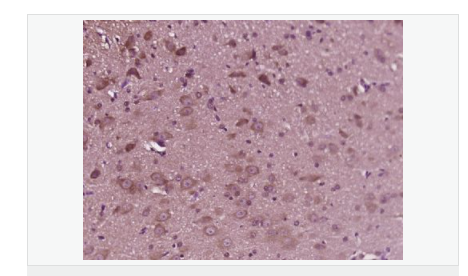

貨號(hào)
產(chǎn)品規(guī)格
售價(jià)
備注
BN40271R-100ul
100ul
¥2360.00
交叉反應(yīng):Mouse,Rat(predicted:Human,Dog,Pig,Cow,Horse,Rabbit,Sheep) 推薦應(yīng)用:WB,IHC-P,IHC-F,ICC,IF,ELISA
BN40271R-200ul
200ul
¥3490.00
交叉反應(yīng):Mouse,Rat(predicted:Human,Dog,Pig,Cow,Horse,Rabbit,Sheep) 推薦應(yīng)用:WB,IHC-P,IHC-F,ICC,IF,ELISA
產(chǎn)品描述
| 英文名稱 | ATP6V1G2 |
| 中文名稱 | 氫離子轉(zhuǎn)運(yùn)ATP合成酶6G抗體 |
| 別 名 | ATP6G; ATP6G2; ATPase H+ transporting lysosomal (vacuolar proton pump) subunit G; ATPase H+ transporting lysosomal 13kDa V1 subunit G2; H(+) transporting two sector ATPase subunit G2; NG 38; NG38; V ATPase 13 kDa subunit 2; V ATPase G subunit 2; V ATPase subunit G 2; Vacuolar ATP synthase subunit G 2; Vacuolar proton pump G subunit 2; Vacuolar proton pump subunit G 2; VMA 10; VMA10. |
| 研究領(lǐng)域 | 腫瘤 細(xì)胞生物 免疫學(xué) 信號(hào)轉(zhuǎn)導(dǎo) |
| 抗體來(lái)源 | Rabbit |
| 克隆類型 | Polyclonal |
| 交叉反應(yīng) | Mouse, Rat, (predicted: Human, Dog, Pig, Cow, Horse, Rabbit, Sheep, ) |
| 產(chǎn)品應(yīng)用 | WB=1:500-2000 ELISA=1:5000-10000 IHC-P=1:100-500 IHC-F=1:100-500 ICC=1:100-500 IF=1:100-500 (石蠟切片需做抗原修復(fù)) not yet tested in other applications. optimal dilutions/concentrations should be determined by the end user. |
| 分 子 量 | 14kDa |
| 細(xì)胞定位 | 細(xì)胞漿 |
| 性 狀 | Liquid |
| 濃 度 | 1mg/ml |
| 免 疫 原 | KLH conjugated synthetic peptide derived from human ATP6V1G2:51-118/118 |
| 亞 型 | IgG |
| 純化方法 | affinity purified by Protein A |
| 儲(chǔ) 存 液 | 0.01M TBS(pH7.4) with 1% BSA, 0.03% Proclin300 and 50% Glycerol. |
| 保存條件 | Shipped at 4℃. Store at -20 °C for one year. Avoid repeated freeze/thaw cycles. |
| PubMed | PubMed |
| 產(chǎn)品介紹 | This gene encodes a component of vacuolar ATPase (V-ATPase), a multisubunit enzyme that mediates acidification of intracellular compartments of eukaryotic cells. V-ATPase dependent acidification is necessary for such intracellular processes as protein sorting, zymogen activation, receptor-mediated endocytosis, and synaptic vesicle proton gradient generation. V-ATPase is composed of a cytosolic V1 domain and a transmembrane V0 domain. The V1 domain consists of three A and three B subunits, two G subunits plus the C, D, E, F, and H subunits. The V1 domain contains the ATP catalytic site. The V0 domain consists of five different subunits: a, c, c', c'', and d. Additional isoforms of many of the V1 and V0 subunit proteins are encoded by multiple genes or alternatively spliced transcript variants. This encoded protein is one of three V1 domain G subunit proteins. This gene had previous gene symbols of ATP6G and ATP6G2. Alternatively spliced transcript variants encoding different isoforms have been described. Read-through transcription also exists between this gene and the downstream DEAD (Asp-Glu-Ala-Asp) box polypeptide 39B (DDX39B) gene. [provided by RefSeq, Feb 2011] Function: Catalytic subunit of the peripheral V1 complex of vacuolar ATPase (V-ATPase). V-ATPase is responsible for acidifying a variety of intracellular compartments in eukaryotic cells. Subunit: V-ATPase is a heteromultimeric enzyme composed of a peripheral catalytic V1 complex (components A to H) attached to an integral membrane V0 proton pore complex (components: a, c, c', c'' and d). Subcellular Location: Melanosome. Note=Highly enriched in late-stage melanosomes. Tissue Specificity: Brain. Similarity: Belongs to the V-ATPase G subunit family. SWISS: O95670 Gene ID: 534 Database links: Entrez Gene: 534 Human Omim: 606853 Human SwissProt: O95670 Human Unigene: 249227 Human Important Note: This product as supplied is intended for research use only, not for use in human, therapeutic or diagnostic applications. |

